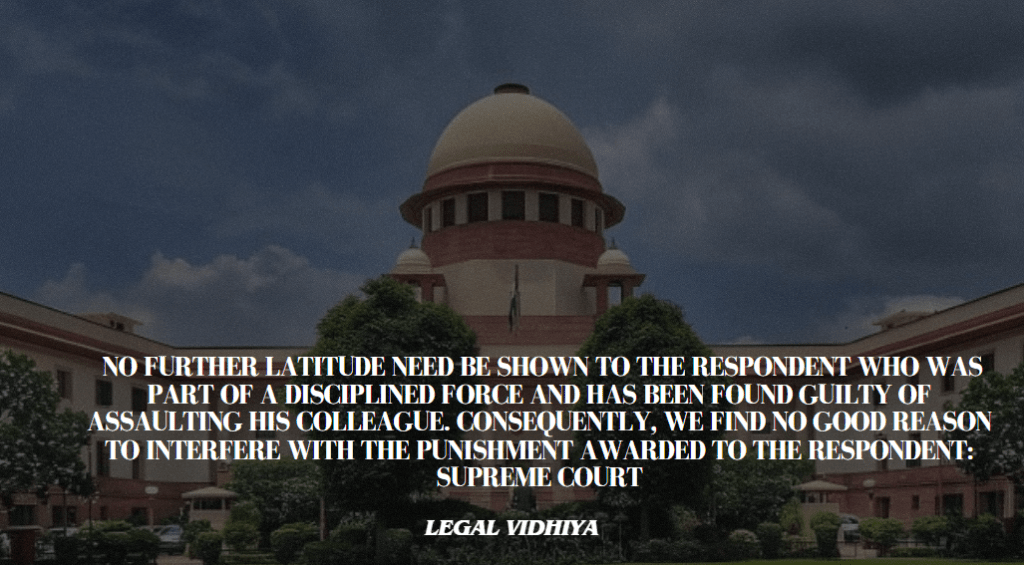
The Supreme Court on 8th May,2024 ,Wednesday had given its judgment on the 2020 compulsory retirement case of a head constable who was working in the CRPF.
In this case a head constable who was working in the Central Reserve Police Force ( CRPF) was charged with an allegation of abuse and assault against his fellow colleagues. After the following allegations were put on the officer, an enquiry was set up against him for his actions and after the enquiry was done all the charges which were against the officer were proved. As a result thereof the respondent ( original petitioner ) was compulsorily retired from his service on the order dated 16.02.2006.
The Respondent ( original petitioner) was not satisfied with this decision and hence, he filed a Writ petition No. 17398/2006 before a single Judge bench of the high court in Cuttack, Odisha. The learned Single Judge vide order dated 14.01.2020 allowed the writ petition, inter alia, on the ground that the punishment of compulsory retirement was not one of the punishments specified in Section 11 (1) of the Central Reserve Police Force Act, 1949.
The Single Judge Bench of the high court had also stated more about the writ petition and the decision of the enquiry in their judgment: “Thus, this court is of the opinion that the award of punishment by the order vide Annexure 5 not only remains bad, but in the circumstances, the consequential order vide Annexure 7 also becomes bad. In such view of the matter and as the Disciplinary Authority is to reconsider the question of punishment, this matter is relegated back to the Disciplinary Authority to hear the question of punishment, giving opportunity of hearing to the petitioner and pass the final order involving the disciplinary proceeding. For a remand of the matter to the Disciplinary Authority, this court observes, the Disciplinary Authority, while reconsidering the matter will also consider other grounds raised herein. For the setting aside of the order vide Annexure 5 and as the matter is relegated back to the authority, the position of the petitioner before passing of the final order shall be restored and for interference of this court with the order vide Annexures 5 and 7 release of the arrears, if any, involving the petitioner shall be dependent on the ultimate outcome involving fresh disposal of the proceeding by the Disciplinary Authority in terms of the directions of the apex court in paragraph 24 of the judgment in the case of Ranjit Singh versus Union of India as reported in (2006) 4 SCC 153.”
The appellant were not satisfied with the order of the Single judge bench of the high court and hence, they had preferred a writ appeal before the divisional bench of the High Court where they had mentioned that the these are serious allegations there which are against him and the charges were proved against him in the enquiry. The appellant had also given the reference of section 11 of the CRPF Act also to prove their point before the divisional bench of the High court.
However, the divisional bench of the High Court had found no merit in the writ appeal of the appellant and hence they dismissed it.
After this the appellants approached to the Supreme Court of India for the final judgment of this case. In this hearing Ms. Aishwarya Bhati, learned Additional Solicitor General, appearing for the appellants, and Mr. Anand Shankar, learned counsel, appearing for the respondent.
Both the sides of the Appellant and the respondents( original petitioner ) had mentioned various points to prove their sides and after listening to both the side the Bench led by Justice B. Pardiwala and Justice Manoj Mishra had said in their judgment that :
- “The learned counsel for the respondent made feeble attempt to challenge the finding returned in the enquiry by claiming that the enquiry officer and the disciplinary authority did not meticulously consider the respondent’s defence and the weaknesses in the evidence led against him. To test the above submission, and to find out whether there is any perversity in the enquiry report, we went through the materials on record and found that there is no such perversity in the enquiry report, which is, in fact, founded on the evidence on record as noticed in the preceding paragraph. Further, no palpable error in the conduct of the enquiry was brought to our notice. The punishment awarded is also not shockingly disproportionate to the proven misconduct. Rather, considering his pservice,already a sympathetic view has been taken in the matter and no further latitude need be shown to the respondent who was part of a disciplined force and has been found guilty of assaulting his colleague. Consequently, we find no good reason to interfere with the punishment awarded to the respondent”.
- For the foregoing reasons, the appeal is allowed. The impugned order of the High Court is set aside. The writ petition filed by the respondent (original petitioner) shall stand dismissed. The punishment of compulsory retirement awarded to the respondent is affirmed. There is no order as to costs.
CASE NAME – UNION OF INDIA AND OTHERS VS SANTOSH KUMAR TIWARI ( 2020)
NAME – DAKSH SRIVASTAVA, COURSE – BA.LLB (Hons) , UNIVERSITY- G.D GOENKA UNIVERSITY , INTERN UNDER LEGAL VIDHIYA.
Disclaimer: The materials provided herein are intended solely for informational purposes. Accessing or using the site or the materials does not establish an attorney-client relationship. The information presented on this site is not to be construed as legal or professional advice, and it should not be relied upon for such purposes or used as a substitute for advice from a licensed attorney in your state. Additionally, the viewpoint presented by the author is of a personal nature




0 Comments